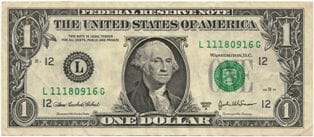Live Casino Poker Etiquette – How Much Do you Tip The Dealer in a Cash Poker Game?

By Steve Beauregard – Like tipping your waitress at a restaurant, it’s customary (and respectful), to tip the dealer at your poker table when playing in a casino.
And just like a restaurant tip, a toke to a dealer is meant to reward competence and acts as a “Thank You” for the service rendered. After all, if there were no dealers, there would be no poker game.
So how much do you tip in a cash poker game?
There are no set rules, so it depends on the size of the game and the pot. In a normal small limit Texas hold’em game, say $2/4, $3/6 or $4/8, tipping $1 or $2 for a normal pot is acceptable.
The same is true when buying in for a standard no-limit hold’em game, $1/2 no-limit. Again, there is no definite answer here, and players may have different opinions depending on who you ask, but unless it’s a pot less than $10, a $1 tip (at minimum), should be given to the dealer. (Go here to learn how much you should tip a dealer in a poker tournament).
Unlike limit hold’em, there may be situations in no-limit when you double or triple your stack in one hand. In these cases, a larger tip is in order. How much larger? It depends on your personal level of generosity, however if say I doubled up on one hand and won a $400 pot, (in which $200 of it was mine that I had put in), I would probably tip a redbird, or $5.
Unlike our waitress and restaurant example in which a 15% tip is standard, tipping the dealer etiquette in card rooms doesn’t follow a set percentage number. A $1 tip will be acceptable for a $20 pot, just as it would for a $50 pot.
There are some exceptions when it is perfectly acceptable not to tip.
Chopping the blinds
To “chop the blinds” means that the small and big blinds are the only players left pre-flop. To avoid a rake and playing heads-up, the players in the small and big blinds may agree to “chop it” or pull back their bets.
In the case of a chop, there is no flop, and no winner or loser. No money goes into the pot, no rake is taken, and no tip is expected.
Chopping is something that should be agreed upon by you and the players on your left and right just as you sit down. “Do you chop?” is something you may want to say to the players on both sides of you, so as to get this out of the way immediately.
Another note about chopping: be consistent. If you and the player to your left agree to always chop, make sure you always chop. If nobody is in the pot pre-flop, and the action gets to you, the small blind, you should chop it with the big blind. It doesn’t matter if you woke up with pocket aces for the first time all week, since you had already agreed to chop every time, you chop (even with aces).
Another scenario in which a tip is not expected is when there is a very small pot.
Say, for example, you raise pre-flop in early position and the action is folded around to everyone. The very tiny pot you have just won (your bet plus the small and big blinds, minus the house rake), does not call for a dealer tip. You’re welcome to throw a $1 to the dealer of course, but it is not expected.
Please also note that only the winners of a pot usually tip. The player who has lot a pot is never expected to tip. You newbies to live casino poker should also know that you are free to tip with either chips from the pot, or with cash from your wallet. However for the most part, tipping a poker dealer is done with chips won from a pot.
One situation in which you are not in a pot, but still may want to tip is when the dealer is leaving their “down,” or their time at the table. When either you, or dealer, are leaving, you may want to give them a tip. This is out of the ordinary, but not unheard of. I’ve been known to do it after several large pots (or several large beers). If the cards have been especially good to you, or you’ve had a good rapport with a nice, competent and friendly dealer, it’s an added bonus to give them a dollar or two when either of you leaves the table.
This is the point where tightwad grumps, or an occasional wannabe pro trying to make a living as a professional poker player begins to complain that tipping makes the game unbeatable and is not profitable for the long term.
Maybe. Maybe not. But if that’s your nitty attitude, you’d be better off playing online at home in your underwear with the other anti-social losers, where there are lower rakes, no tipping, and none of that pesky interaction with fellow members of the human race. Oh, and by the way, if a $1 tip is going to have a noticeable impact on your yearly income, you are in the wrong profession.
Playing poker in a casino means mingling and becoming social with other people, (and is more fun by the way). For the vast majority of us, poker is not our vocation, nor should the question of the negative expected value of tipping be factored into the thinking of players like me, who will be seated in a poker game only a few times a year.
Tipping rewards competence. We need to have good, sound, professional dealers running our poker games, otherwise it slows down the game, creates a atmosphere where there is confusion and many mistakes, and just generally makes the who experience much less enjoyable.
So enjoy your poker game. Hopefully you will win pot after pot. And when you do, please be sure to remember to tip your dealer. They deserve it.
